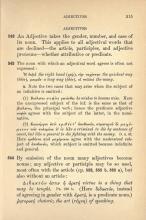542. An Adjective takes the gender, number, and case of its noun. This applies to all adjectival words that are declined—the article, participles, and adjective pronouns—whether attributive or predicate.
543. The noun with which an adjectival word agrees is often not expressed.
Ἡ δεξιᾱ́ (χείρ)
the right hand
τὴν ταχίστην (ὁδόν)
the quickest way
μακρᾱ́ν (ὁδόν)
a long way
οἱ πολλοί
the many
a. Note the two cases that may arise when the subject of an infinitive is omitted.
Bούλεται σοφὸς γενέσθαι
he wishes to become wise.
Here the unexpressed subject of the infinitive is the same as that of βούλεται, the principal verb; hence the predicate adjective σοφός agrees with the subject of the latter, in the nominative.
Κακούργου ἐστὶ κριθέντʼ ἀποθανεῖν, στρατηγοῦ δὲ μαχόμενον τοῖς πολεμίοις.
It is like a criminal to die by sentence of court, but like a general to die fighting with the enemy.
Demosthenes 4.47
Here κριθέντα and μαχόμενον agree with the understood subject of ἀποθανεῖν, which subject is omitted because indefinite and general.
544. By omission of the noun many adjectives become nouns; any adjective or participle may be so used, most often with the article (cp. §§ 552, 555.b, 582.a), but also without an article.
Διδακτόν ἐστιν ἡ ἀρετή.
Virtue is a thing that may be taught.
Plato Protagoras 320b
Here διδακτόν, instead of agreeing in gender with ἀρετή, is a predicate noun.
ῥητορική
rhetoric, the art (τέχνη) of speaking.

